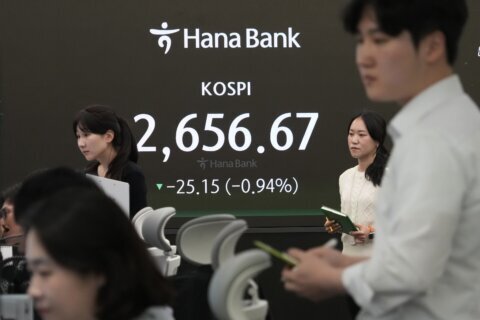MONTEVIDEO, Uruguay (AP) — A summit of the four Mercosur nations exposed tensions Tuesday as Uruguay’s eagerness to seek out foreign markets collided with opposition from Brazil, Argentina and Paraguay.
Uruguayan President Luis Lacalle Pou said his country must “open up to the world” and it intends to negotiate a free trade agreement with China as well as join the Trans-Pacific Partnership.
“We are one of the most protectionist areas in the world,” he said of the bloc, speaking at the meeting in Mercosur’s headquarters in Montevideo.
Uruguay has complained of economic damage from the bloc’s tariffs and other trade restrictions and criticizes the failure of Mercosur to reach trade agreements with any of world’s 10 biggest economic powers.
Lacalle Pou urged the other members to explore an agreement with China. “Or course, if we go in a group it’s much better, but we’re not willing to sit still,” he said.
The foreign ministers of Paraguay, Brazil and Argentina have threatened Uruguay with legal and trade sanctions if it tries to strike deals on its own, saying that would violate the bloc’s rule for consensus for decision-making.
Argentine Foreign Minister Santiago Cafiero said Monday that bilateral agreements could “deepen our productive and scientific-technological gaps.”
On Tuesday, Argentine President Alberto Fernandez did agree with a complaint by Lacalle Pou that there are problems in the bloc because asymmetries have grown in the members’ economies since its founding 31 years ago.
“We never solved them. It’s time to see how we solve them,” Fernandez said.
Some 295 million people live in Mercosur, by far most of them in Brazil and Argentina. The bloc exports mostly agricultural products, with China (29%) and the United States (11%) its biggest trade partners. Exports reached $339 million and imports $260 million in 2021, the bloc says.
Marcel Vaillant, a regional trade specialist, noted the economy of Uruguay, which has about 3.5 million people, is dwarfed by those of Argentina and Brazil, which he said “have ultra-protected economies,”
“Uruguay is a very small economy, with preferences for an open policy that has increasing difficulties in accessing markets in agri-food products and needs to improve market access,” Vaillant said.
Copyright © 2024 The Associated Press. All rights reserved. This material may not be published, broadcast, written or redistributed.






